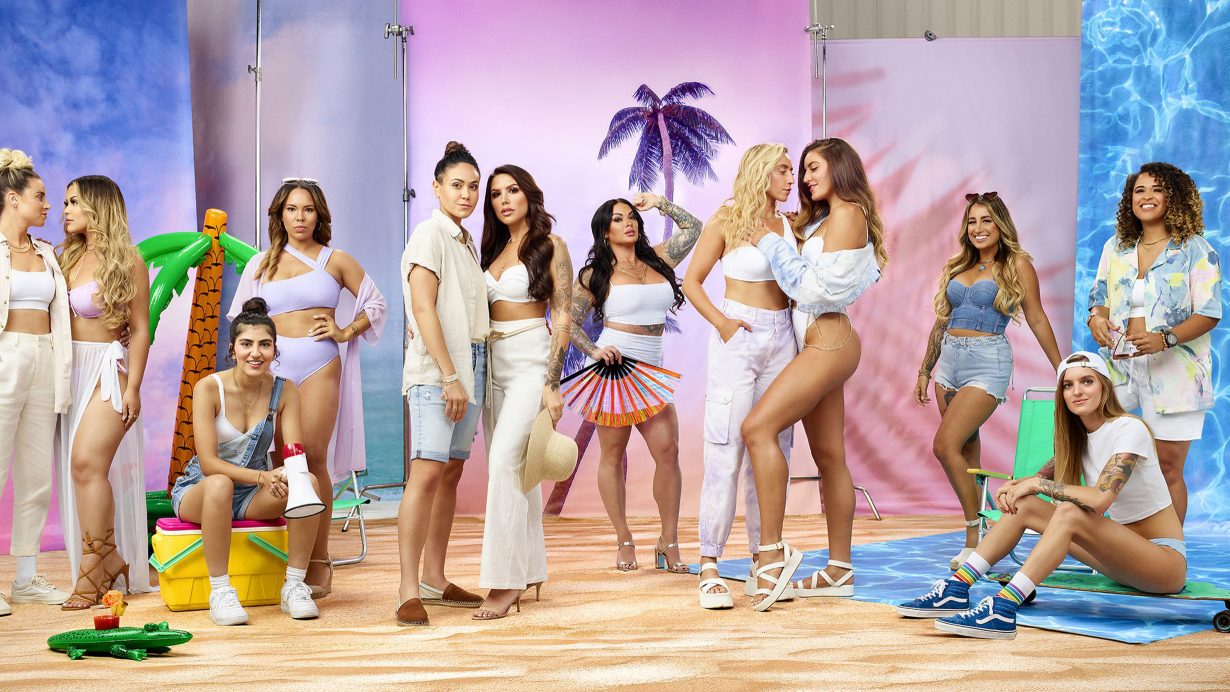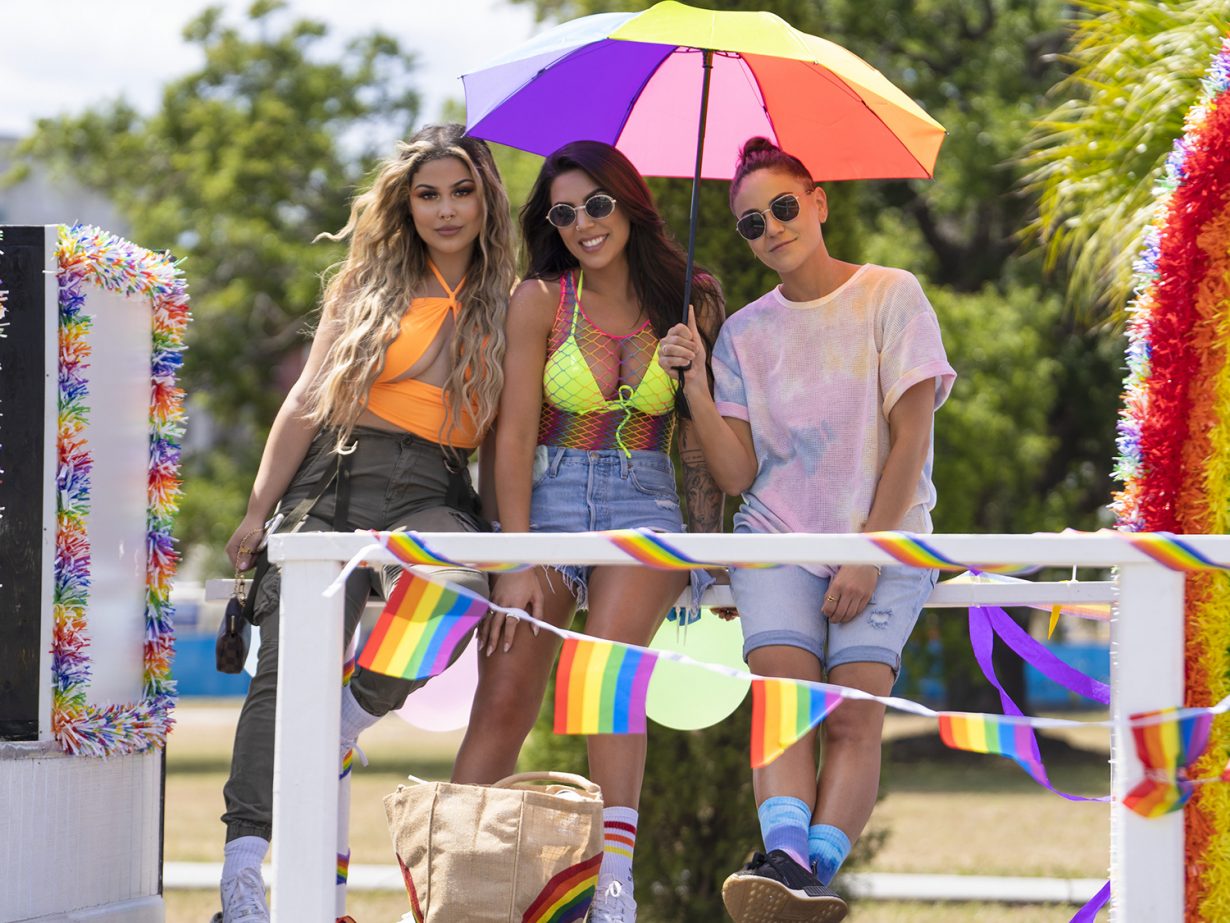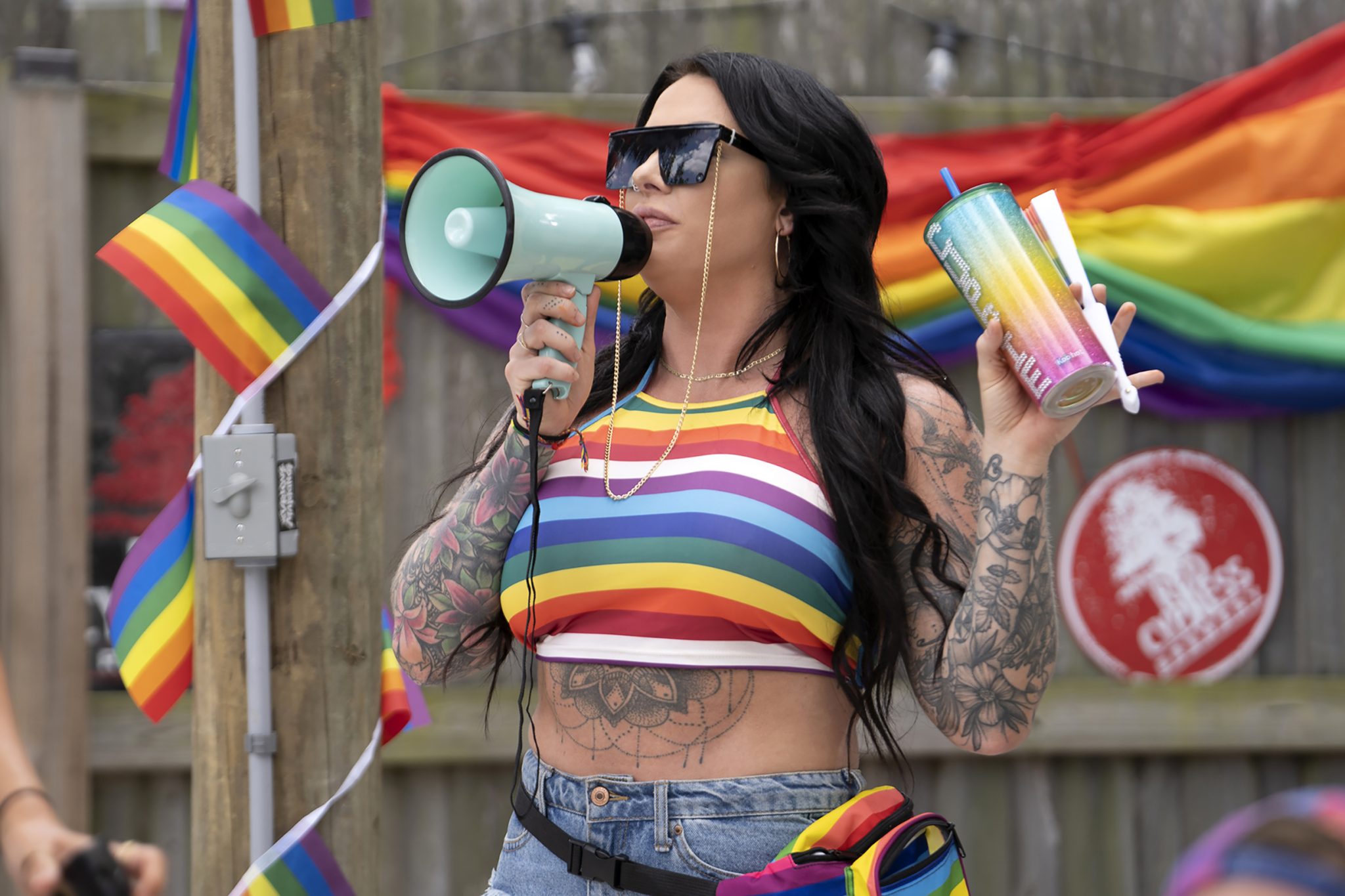Is being represented as basic, marriage-aspiring, charcuterie-loving, property-developing lesbians not true equality in 2021?
There is a Saturday Night Live parody sketch called Cherry Grove, which in comparison to its spirited gay male counterpart Fire Island, features a group of affluent lesbians who jigsaw, childrear, and are dairy intolerant. Lesbians, we are told to believe, are sexless, domesticated, white, and rich. Amazon’s new reality TV-cum-docuseries show Tampa Baes (2021) certainly aims to correct this narrative. With the return of it-girl lesbian, Cuppie Bragg, to Florida’s Tampa Bay, the show promises an exploration of the local lesbian scene, following their various feuds, engagements, and one-night stands. For all that is wrong with the show – reader: there is a lot wrong with Tampa Baes – it’s quite uplifting to see a bunch of lesbians carefree, clubbing, drinking, and having casual sex.
If the latest slew of historical period dramas – Ammonite (2020), Portrait of a Lady on Fire (2019), Summerland (2020), Lizzie (2018) – are anything to go by, lesbians aren’t often afforded this kind of representation. Sad, isolated, and melancholic lesbians are everywhere in cinema at the moment: they’re often to be found living in some desolate seascape, painting and/or fossil-hunting, and having sex wearing multiple layers of crinoline or linen. If as film critic Andrea Weiss argues, in film, only one, singular image of the lesbian may surface at any one time, then the sad single queer woman abounds as a monolithic one. I know lots of people who found Tampa Baes depressing, but is being represented as basic, marriage-aspiring, charcuterie-loving, property-developing lesbians not true equality in 2021? Probably not, but I will watch anything with a main character named Cuppie, lots of terrible rainbow murals of women kissing, a simmering feud between two sets of queen bee lesbians and a host of fedora-wearing characters who communicate in therapy-speak (most of the women on the show just want to be ‘authentically themselves’).
The show, like most reality TV, is founded upon the important intersecting axes of relationship and family, capital, and alcohol. Most of its storylines contain one of these underlying threads. And as with most reality TV shows where issues of identity manifest in empty gestures, race and otherness in the show is sorely underwritten and treated as a tantalising, fetishistic garnish (the experience of black contestants on Love Island – so often picked last in the dating show’s ‘coupling’ ceremonies, subject to racialised language and microaggressions – makes abundantly clear that you cannot patch over the racialisation and gendering of desire with representation alone).

But Tampa Baes also reveals things that exceed the tightly controlled format of reality-TV, and the failures of representational politics. In the episode ‘The Family Bae’, we learn that Summer Mitchell, a femme lipstick-lesbian, clearly had a difficult upbringing. Unequivocally, her relationship with her parents is so much better now (the homophobia and shame that these characters have clearly experienced is often brushed over in favour of a more progressive narrative of acceptance). During their visit, Summer’s mother pulls out a ‘mint-green suitcase’, which Summer explains ‘contains’ her ‘grandmother’, and all of her belongings and pieces of her ‘Native American heritage’. Marissa Gialousis, her partner, cries as Summer wears various headdresses and traditional outfits; Summer’s mum promptly disappears in tears.
The story then segues into Summer’s past where her parents clearly didn’t accept her coming out (her friend asks her, ‘I wonder if they ever think back to those times’). Times, which Summer summarises as ‘acceptance, we hate you, acceptance, we hate you’. In a talking head, we hear the producer ask: ‘so you don’t wanna talk about those times?’ Summer breaks down in tears. Summer doesn’t want to think of her parents in that way. ‘They’re such good people’, she tells us, ‘it sucked that me being gay had to change what we had’. For all its failures, it’s moments of hide-and-seek like this where the show offers a slice of the complicated, intersecting nature of trauma, race, and sexuality, and the complex ways we attach ourselves to visions of the hetero/homonormative family, despite the oblique pain and suffering that such a commitment might entail.

Throughout, however, the show is underpinned by a distinctive sanitising of queerness’s relationship to colonialism. The show has already been condemned for its focus on white lesbians, while lesbians of colour are presented as ‘characters instead of actual cast members’. What is perhaps most galling however is not only the cast’s lack of diversity, but the ways in which histories of queerness, colonialism and racialisation are presented as universally discrete. Shiva Pishdad, the show’s comedic relief, is Iranian American, and admits that she never imagines telling her grandparents that she is gay. For Pishdad, being gay and being Iranian is ‘two polar opposites. It’s so not accepted where my parents are from’. At the same time, throughout the series, America is celebrated as progressive and for its tolerance and growing acceptance of queers.
Like RuPaul’s Drag Race’s overt embrace of homonationalism, Tampa Baes buys into a discourse of freedom and American exceptionalism. There is no mention of the fact that the illegality of same-sex desire in the Middle East was developed and codified hand in hand with European expansionism and colonialism. Similarly, the economic disparity of Tampa Baes’ cast is often glossed over; we have those who do some aspect of care work such as nursing or those who strip and work in bars and then those who own huge houses and work in ‘property’. While the show’s clear villain, Brianna Murphy, lives with her partner Haley Grable in the kind of clinical, echoey mansion that would make the Oppenheim Group swoon, our tragic hero Olivia Mullins hosts a car wash, with the rest of the bikini-clad cast, to raise money to pay for her DUI fine (she refuses a cash handout from Brianna). Perhaps this, then, is the crux of the issue: in Tampa Baes, wealth, equality and security are presented as the rootless, universal truths of meritocracy. The presence of difference, precarity and otherness threatens this narrative arc, but this is so often papered over and naturalised, despite revealing the flickering shadows of a distinct capitalist hegemony in its wake. Perhaps, however, this is merely reality TV’s guiding mantra.
Like the Showtime drama The L Word did in 2004, Tampa Baes aims to fill a void in on-screen lesbian representation. But, in reality, it only does more to emphasise the bad politics of what happens when queerness becomes basic. And yet, like Summer’s devotion to the familial matrix, and for all its failings, I am attached to bad reality TV. With so many of my other favourite reality TV shows – Real Housewives, Selling Sunset, Love is Blind, Below Deck – doing little to offer a glimpse of queer life, it becomes even harder to divest myself from the dream of TVs representational politics. Will I watch the second season? Absolutely.
